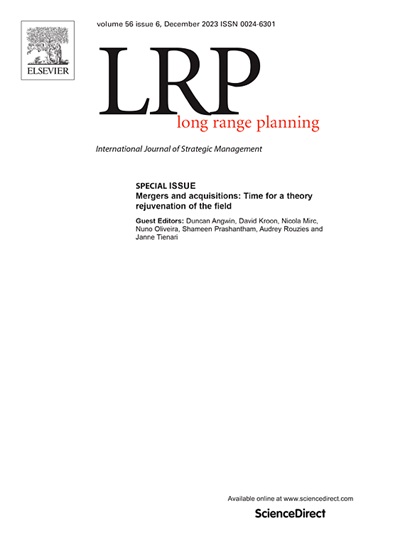Inward internationalization and cross border acquisitions by emerging economy multinational enterprises: The moderating role of family and institutional ownership
IF 6.3
2区 管理学
Q1 BUSINESS
引用次数: 0
Abstract
Mergers and acquisitions are a complex and persistent global phenomenon. Theoretical cross-fertilization enhances our understanding of their behavior, especially in different contexts. We use organizational learning theory and institutional logic perspective to hypothesize the direct effect of inward internationalization, the negative moderating effect of family ownership and domestic institutional ownership, and the positive moderating effect of foreign institutional ownership on cross-border acquisitions (CBAs) by emerging economy multinational enterprises (MNEs). Based on data from 199 Indian MNEs over nine years consisting of an unbalanced panel with 1619 observations, our findings supported all the hypotheses except the moderating effects of domestic institutional ownership. Our findings explain that the impact of learning from inward internationalization on CBAs is not similar for all firms; rather, it depends upon ownership groups because of their institutional logic. We have proposed socioemotional wealth logic for family ownership, cautious fosterer logic for domestic institutional ownership, and yield maximizer logic for foreign institutional ownership. Our findings enhance our understanding of firms’ CBA behavior by utilizing theoretical cross-fertilization and examining CBAs in an emerging economy context.
新兴经济体跨国企业的内向国际化和跨境收购:家族所有权和机构所有权的调节作用
并购是一种复杂而持久的全球现象。理论上的相互借鉴可以加深我们对并购行为的理解,尤其是在不同背景下。我们运用组织学习理论和制度逻辑视角,假设内向国际化对新兴经济体跨国企业跨境并购(CBAs)具有直接影响,家族所有权和国内机构所有权具有负向调节作用,国外机构所有权具有正向调节作用。基于 199 家印度跨国企业九年来的数据(包括 1619 个观测值的非平衡面板),我们的研究结果支持了除国内机构所有权的调节作用之外的所有假设。我们的研究结果说明,从内向国际化中学习对CBA的影响并非对所有企业都相似;相反,它取决于所有权群体,因为它们的制度逻辑不同。我们提出了家族所有权的社会情感财富逻辑、国内机构所有权的谨慎培育逻辑和国外机构所有权的收益最大化逻辑。我们的研究结果通过利用理论交叉融合和研究新兴经济体背景下的公司企业价值评估行为,加深了我们对公司企业价值评估行为的理解。
本文章由计算机程序翻译,如有差异,请以英文原文为准。
求助全文
约1分钟内获得全文
求助全文
来源期刊

Long Range Planning
Multiple-
CiteScore
13.00
自引率
7.10%
发文量
75
期刊介绍:
Long Range Planning (LRP) is an internationally renowned journal specializing in the field of strategic management. Since its establishment in 1968, the journal has consistently published original research, garnering a strong reputation among academics. LRP actively encourages the submission of articles that involve empirical research and theoretical perspectives, including studies that provide critical assessments and analysis of the current state of knowledge in crucial strategic areas. The primary user base of LRP primarily comprises individuals from academic backgrounds, with the journal playing a dual role within this community. Firstly, it serves as a platform for the dissemination of research findings among academic researchers. Secondly, it serves as a channel for the transmission of ideas that can be effectively utilized in educational settings. The articles published in LRP cater to a diverse audience, including practicing managers and students in professional programs. While some articles may focus on practical applications, others may primarily target academic researchers. LRP adopts an inclusive approach to empirical research, accepting studies that draw on various methodologies such as primary survey data, archival data, case studies, and recognized approaches to data collection.
 求助内容:
求助内容: 应助结果提醒方式:
应助结果提醒方式:


